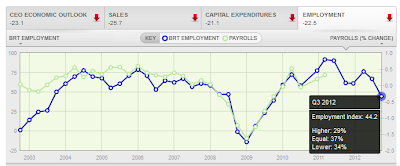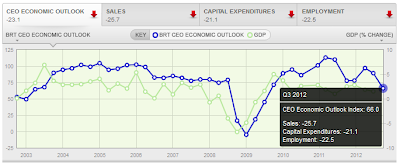Mish's Global Economic Trend Analysis |
- Concerns Mount that ECB Bond-Buying Program Is Illegal; Concerns? What Concerns?
- Foreigners Dump €89.6 Billion Spanish Bonds; Spanish Bank Exposure Increases by €108.8 Billion
- US CEOs Sharply Reduce Expectations for Economic Outlook, Hiring; Third Largest Plunge in 6-Month Expectations in History; Reflections On "Uncertainty"
| Concerns Mount that ECB Bond-Buying Program Is Illegal; Concerns? What Concerns? Posted: 02 Oct 2012 07:38 PM PDT Even though the German constitutional court gave its blessing to ECB president Mario Draghi's OMT program, Concerns Mount that ECB Bond-Buying Program Is Illegal. The markets have celebrated Mario Draghi's announcement that the European Central Bank will embark on unlimited purchases of sovereign bonds from crisis stricken countries. But are such purchases really legal? Draghi's own justification for the program leaves plenty of room for doubt.Concerns? What Concerns? Concerns are in the eye of the beholder. Moreover, I have no doubt that German chancellor Angela Merkel knows full well that not only is the ECB's program in violation of ECB mandates, it is also against the German constitution. Even ardent supporters of the Euro at Eurointelligence have admitted as much. ...The legal argument is quite strong in our view. The entire euro rescue effort is legally tenuous, and hard to square with what we already know about the German constitutional court's interpretation of the Treaties, and its views on the scope and limits of financial crisis management. We know out of experience that it is always wrong to second-guess this fiercely independent court. The only thing we do know, in contrast to many financial market participants, is that the court will not take into account the financial market reaction of its decision. Had Merkel made objections against the OMT, the court would likely have struck it down. However, Merkel does not want the disintegration of the euro on her watch and that is all that matters. There was no vote by German citizens. And as expected, the German constitutional court bowed to her majesty Angela Merkel. She was willing to sell her soul for her political beliefs and to preserve her legacy. Merkel sold her soul alright, its her legacy that is in question. German Central Bank Concerns Irrelevant as Well Concerns by the German central bank do not matter either. The same thing happened with Fed actions in 2008 and 2009. I wrote about this well in advance (on April 03, 2008 to be precise), and it is one of my personal favorite posts. I have referred to it often enough but in case you missed it, please consider the Fed Uncertainty Principle, specifically corollary number four. Uncertainty Principle Corollary Number Four: The Fed [ECB] simply does not care whether its actions are illegal or not. The Fed [ECB] is operating under the principle that it's easier to get forgiveness than permission. And forgiveness is just another means to the desired power grab it is seeking. Politicians in high power as well as central banks do not give a damn about concerns, nor do they care about obvious illegalities. They do what they want because they consider themselves to be above the law. Concerns about legalities are for peons, not the royal court. In the end, it does not matter what the concerns are, or even what the popular vote total is. All that matters is who gets to vote, and more importantly, who gets to count the votes. Mike "Mish" Shedlock http://globaleconomicanalysis.blogspot.com/ |
| Foreigners Dump €89.6 Billion Spanish Bonds; Spanish Bank Exposure Increases by €108.8 Billion Posted: 02 Oct 2012 11:26 AM PDT European banks are supposed to be deleveraging. By now, most realize they are headed the opposite direction. In Spain, the increased leverage is pro-cyclical, 100% certain to cause a bigger problem down the road. Here is a Mish-modified translation of an El Economista article on Spanish Bond Purchases. Financial institutions have become the main investor in Spanish government bonds after foreigners withdrawn €89.6 billion in the first eight months of the year, according to Treasury data. In these eight months, Spanish exposure has risen €108.8 Billion, a record 106.84% increase. Meanwhile, foreign investment in Spanish debt has dropped 31.8% during the same period, standing at €191.836 billion euros, compared to €281.439 at the end of 2011. This is the second consecutive time since 2008 that the debt in foreign hands is below the €200 billion. Banks are now the main investor, ahead of foreigners, accumulating now 34.07% of the public debt, compared to 33.49% by foreign investors. This situation has not occurred since 2003. Mike "Mish" Shedlock http://globaleconomicanalysis.blogspot.com/ |
| Posted: 02 Oct 2012 08:37 AM PDT Plunge in CEO Expectations The quarterly survey of CEO expectations looking six months out shows that while CEOs are still positive in regards to capital spending and sales, the recent plunge was the third largest plunge in expectations in history. John Engler, president of the Business Roundtable discusses CEO sentiment in the following video. Link If Video Below Does Not Play: CEO Rountable Video Read the transcript of the call for comments from BRT President John Engler and BRT Chairman and Boeing CEO Jim McNerney. Hiring Contraction More CEOs than not expect reduced employment in the next six months.  click on chart for sharper image CEOs Sharply Reduce Expectations for Economic Outlook, Hiring Business Roundtable notes CEOs Sharply Reduce Expectations for U.S. Economy. The results of Business Roundtable's (BRT) third quarter CEO Economic Outlook Survey for 2012 show a further downturn in CEOs' expectations for sales, capital spending and hiring for the next six months. The Business Roundtable CEO Economic Outlook Survey Index decreased to 66.0 in the third quarter of 2012 from 89.1 in the second quarter of 2012, the lowest reading since the third quarter of 2009 and the third largest single quarter drop in the survey's history.Plunge In Economic Outlook  click on chart for sharper image Reflections On "Uncertainty" CEOs blame "uncertainty" which is nothing more than a euphemism for poor business conditions. It's as if there is some unwritten rule that CEOs can only be "certain" of good things, never bad. Yes, there is this "fiscal cliff" thing, but business is slowing already, globally, and not just because of a "fiscal cliff". Simply put, CEOs can easily see things are already getting worse or at least not improving. Finally, no one can ever truly be "certain" about anything economically speaking six months down the road. CEOs and politicians just do not want to say "conditions suck" so instead they complain about "uncertainty". Mike "Mish" Shedlock http://globaleconomicanalysis.blogspot.com/ "Wine Country" Economic Conference Hosted By Mish Click on Image to Learn More  |
| You are subscribed to email updates from Mish's Global Economic Trend Analysis To stop receiving these emails, you may unsubscribe now. | Email delivery powered by Google |
| Google Inc., 20 West Kinzie, Chicago IL USA 60610 | |

No comments:
Post a Comment